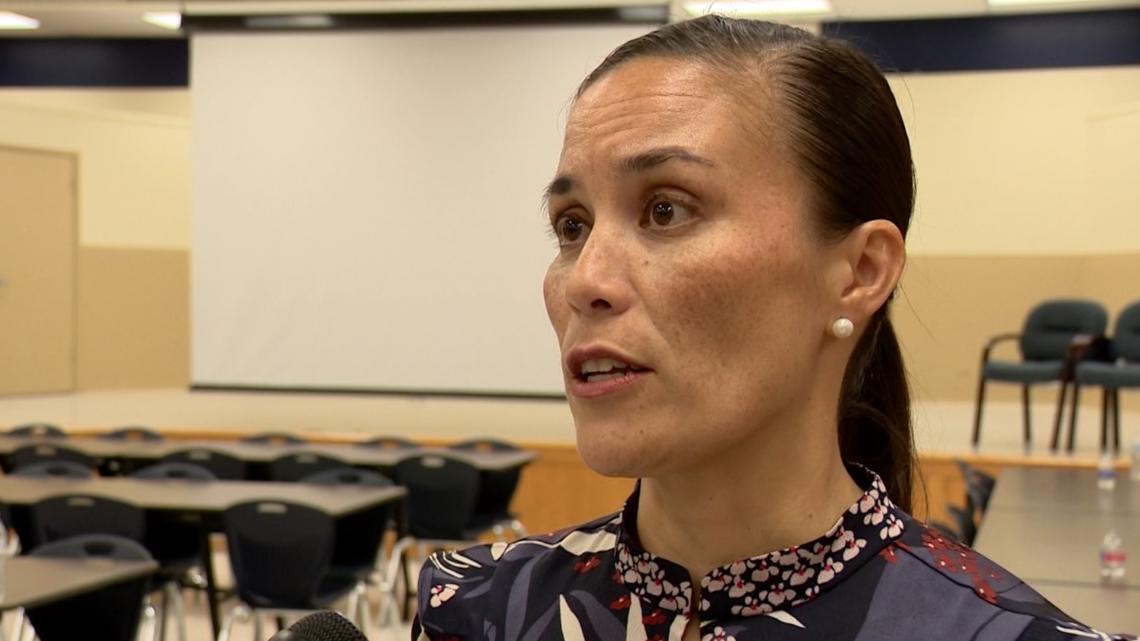
Mayor Gina Ortiz Jones questioned footage of a councilwoman’s court proceedings after her DWI arrest, sparking a debate over public court access.
SAN ANTONIO — The arrest of a San Antonio City Council member who police say was driving drunk one July night prompted an email back-and-forth between Mayor Gina Ortiz Jones and county leaders over her concerns that video of the city leader being magistrated was “leaked” to news media, according to records obtained by KENS 5.
Responding to Jones’ request to know how the county was “investigating how that leak happened,” Bexar County leaders not only said the public has access to county livestreams of arrested people being informed of their charges and rights, but warned that the city is open to potential lawsuits because its own magistration process isn’t as readily open to the public.
“(Legal) doctrine requires that any closure of judicial proceedings be justified on a case-by-case basis and only for compelling reasons,” District Court Judge Ron Rangel told Jones in the Monday afternoon email.
The exchange began with an initial email sent by the mayor the evening of July 25, less than 24 hours after newly elected City Councilwoman Ivalis Meza Gonzalez was arrested and charged with DWI. Various news outlets showed video of Gonzalez meeting with the magistrate judge in the hours after her arrest.
“Unfortunate about the leaked video surrounding the CW’s arrest,” Jones wrote in a 7:23 p.m. email to County Judge Peter Sakai. “As I understand, such a leak is unprecedented. Would appreciate your office investigating how that leak happened. Please let us know if you need anything to facilitate.”
Sakai responded the following Monday, July 28, at 1:21 p.m. He said he objected to Jones characterizing the media’s use of the livestreamed video as the result of a leak, writing that the magistrate court and its accompanying live feed amounts to a “public courtroom pursuant to statutory and constitutional laws of the States of Texas.”
“Second, it is standard operation rule that all proceedings of the magistrate court is livestreamed and thus, accessible to the public,” Sakai wrote, before asking Rangel to weigh in “with the laws and rules that apply.”
Jones, replying to Sakai on July 30, said she welcomed Rangel’s insight before writing that “I am still troubled that the media seemed to have real time access to the Councilwoman’s video.”
“My understanding is that the County’s magistration process is live streamed through the County’s website but there is no archive for search or retrieval,” the mayor said. “Consequently, there remains a real concern that someone was tipped that the Councilwoman would soon appear on the live stream unless media outlets continually monitor live stream magistrations.”
Jones added she and city staff would investigate whether there was an “internal alert to a third party” of Gonzalez being magistrated and that she hoped Bexar County would follow suit. She finished her email expressing concern over the “personal and professional consequences to the individual of having those images on public airwaves.”
Rangel responded Monday afternoon to an electronic conversation that started with six people and grew, by this point, to 15.
The district court judge in effect wrote a brief dissertation, starting with the clarification that Bexar County has provided “a live feed of the magistration proceedings since 2020.”
Over the course of his two-plus-page email, Rangel shared how the county’s practice is rooted in federal and state law, as well as the public’s right to attend court proceedings as outlined by the First Amendment. Citing multiple past court cases, he explained how the county’s practice prevents it from being criticized as “non-transparent, inaccessible and unaccountable” to residents.
Rangel went on to say Caldwell County was sued by news outlets for closing its own magistration proceedings to the public—an argument in which the courts ultimately ruled for the media.
“These same rulings bind Bexar County officials,” Rangel said. “As I understand it, the City’s current magistration process is not open to the public leaving the City vulnerable to similar lawsuits… denying that access can undermine efforts to evaluate and improve those systems and can lead to an erosion of the public’s confidence.”
He ended his email saying he welcomed “further collaboration” to create a more accountable system.
